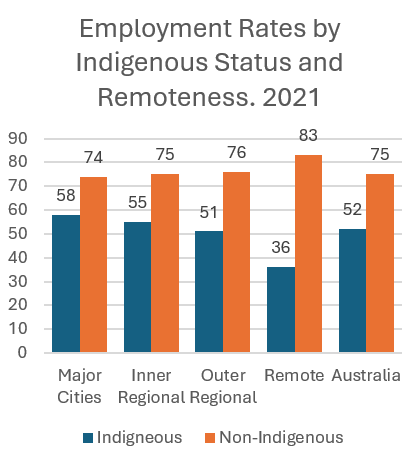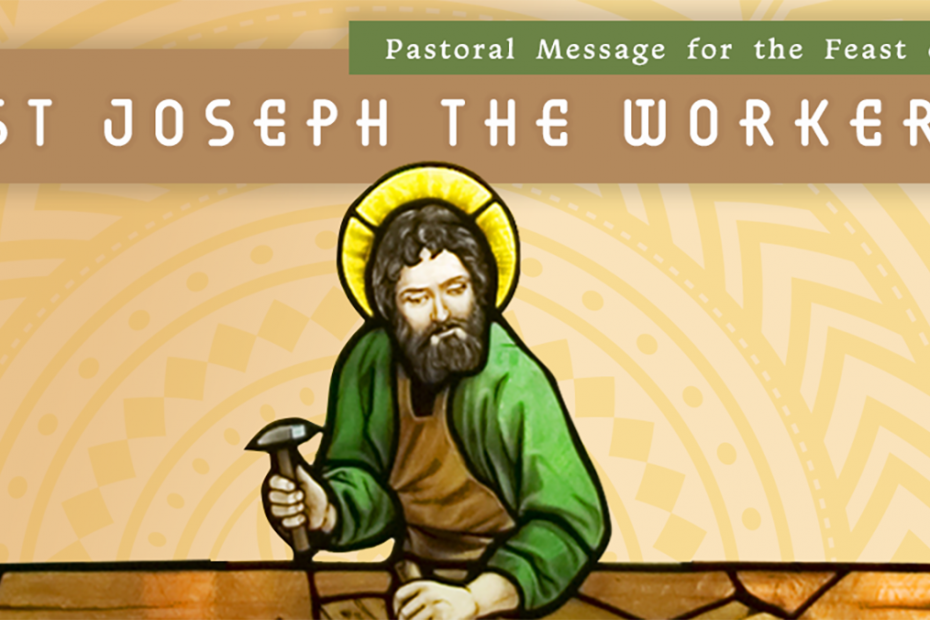Following the 2023 Social Justice Statement, this years message for the Feast of St Joseph the Workerhighlights the ongoing disparity and discrimination facing Aboriginal and Torres Strait Islander people in the workforce.
For those wishing to learn more of these challenges, a supplementary set of case studies, suggested prayers and actions are available.
Inequality Facing Indigenous Australian Workers
Last year, The Bishops of Australia issued their Social Justice Statement Listen, Learn, Love: A New Engagement with Aboriginal and Torres Strait Islander People, highlighting the systemic dispossession facing Australia’s Indigenous Peoples, and calling for a new way forward that respects their dignity and cultural heritage.
These are challenges that Indigenous Australians have faced for generations, and efforts to address the significant gaps between Indigenous and Non-Indigenous Australians have met with middling success. Disparity in employment remains one of the key indicators of efforts to close the gap, and a driving factor affecting social, economic, and health outcomes.
The Feast of St. Joseph the Worker emphasizes the dignity of labor and the importance of work in the life of an individual, as exemplified by Saint Joseph’s dedication to his craft as a carpenter.
Historical Context
To comprehend the challenges faced by Aboriginal and Torres Strait Islander people in the contemporary workforce, it is imperative to acknowledge the historical injustices that have shaped their experiences. Colonization, dispossession of land, forced removal of children (the Stolen Generations), and discriminatory policies have had enduring impacts on Indigenous communities.
By recognizing and working in partnership with First Nations Peoples in addressing these challenges, we can strive towards a future where Indigenous individuals have equal opportunities to thrive and succeed in their chosen careers.

Educational Disparities
The gap in employment rate steadily decreases with education level, with Indigenous Australians holding a bachelor’s degree or higher at parity with non-indigenous Australians.
More than half of Indigenous Children are not consistently attending a school.
Unfortunately, disparity in educational attainment remains one of the critical drivers of inequality and targets to close the gap at most education levels are not on track, with indigenous Children more than twice as likely as non-indigenous children to be missing schooling opportunities.
One of the indicators of the closing the gap initiative that is on target is Year 12 attainment, with significant improvements since 2006, notably in very remote communities where rates almost doubled from 23% to 43%.
While State and National policies and education departments continue their efforts to close the gap, in the schooling system, with their commitment to inclusive and holistic education, Catholic schools can innovate their own practices for closing the gap in educational attainment between Indigenous and non-Indigenous students.
Discrimination in the Workforce
While Australians overwhelmingly support inclusive workplaces when surveyed (75%) , the reality is 59% of Indigenous employees report experiencing harassment or discrimination in the past 12 months, with more than half reporting that coworkers make incorrect assumptions about their abilities because of their background . First Nations employees face the highest levels of discrimination in the workplace, and that number is rising, up from 50% in 2021.
Indigenous Australians earn 73c for every $1 earned by non-indigenous Australians.
There is significant space for employers to implement culturally sensitive hiring practices and training, with only 16% of private sector firms setting employment targets for First Nations Peoples. Less than half of Employers and organizations report undertaking any kind of workplace diversity training, mirroring the proportion of leaders in organisations who deem diversity and inclusion practices as a priority.
Indigenous representation in leadership roles within organizations remains disproportionately low 0.7% . A lack of diverse perspectives at decision-making levels hinders the development of inclusive policies and practices.
Geographical Isolation
Many Indigenous communities are in remote or rural areas with limited access to job opportunities, with a lack of suitable jobs and transport problems, including lack of a driver’s licence, being identified as the two biggest barriers to employment in remote areas.
This geographical isolation further compounds existing challenges, making it difficult for individuals to access training, networking, and employment options available in urban centres.
The Lord God took the man and put him in the garden of Eden to till it and keep it
(Gen 2:15)
In Amoris Laetitia, Pope Francis highlights the biblical basis for work as an essential component of human dignity; That Man is placed into the garden of Eden, and that through his Labor, cultivates both the gifts of the Earth, and his own talents.
Programs, such as the Community Development Program (CDP), were attempts to address the shortage of employment opportunities in remote areas, by providing income assistance in exchange for “work-like activities”.
In practice the CDP was criticised for having been designed with poor consultation, and without consideration for the realities of remote communities, with the “work-like activities” described as neither meaningful or fulfilling, nor providing any clear pathway or skills to transition to paid employment.
These activities, paying significantly below the minimum wage , were incompatible with human dignity, but rather widely viewed as administrative obligations by Governments seeking to crack down on perceived dole-bludging, that often saw participants doing “stuff for stuff’s sake”. It perpetuated already bad situations with no meaningful outcomes for training, upskilling or future visions for their communities. First Nations participants in the scheme were also disproportionately the recipients of non-compliance notices and fines.
In response to these criticisms, the current government has recently announced that the CDP will be replaced by a new Remote Job and Economic Development scheme (RDEJ), designed in consultation with First Nations communities, to create authentic jobs in remote areas.
Industry and Automation
Technological changes will continue to change the nature of employment in Australia, with certain sectors and industries either disproportionately benefiting from, or negatively impacted by emerging technologies.
In Laudato Si’, Pope Francis warns us of the dangers of pursuit of technological advancement, at the expense of human dignity, and the risks of economies orientated towards short-term financial gains. A society that promotes automation and cost-saving at the expense of people is working against itself.
“I would like to remind everyone, especially governments engaged in boosting the world’s economic and social assets, that the primary capital to be safeguarded and valued is man”
Caritas in Veritate no. 25
Routine and manual jobs, including retail, manufacturing, and construction, are increasingly susceptible to automation, with falling employment levels projected . These same sectors account for 61% of the indigenous workforce.
Conversely, non-routine cognitive work, such as STEM and managerial roles, presently accounts for just 21% of indigenous workers. These industries are forecasted to both be significant contributors to future employment growth, and to most benefit from innovation and productivity growth.
A national policy to support Indigenous employees successfully transitioning from the former industries to the latter is critical to ensure that disparities between indigenous and non-indigenous Australians do not widen.
For May 1, we invite all people to invoke intercessory prayers for First Nations people facing discrimination in the workforce, for governments and business leaders to work with First Nations Communities, and for employers to commit to culturally safe workplaces.
